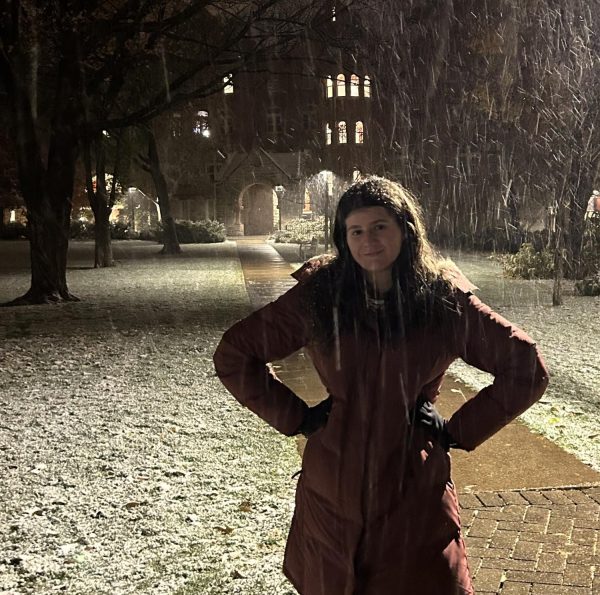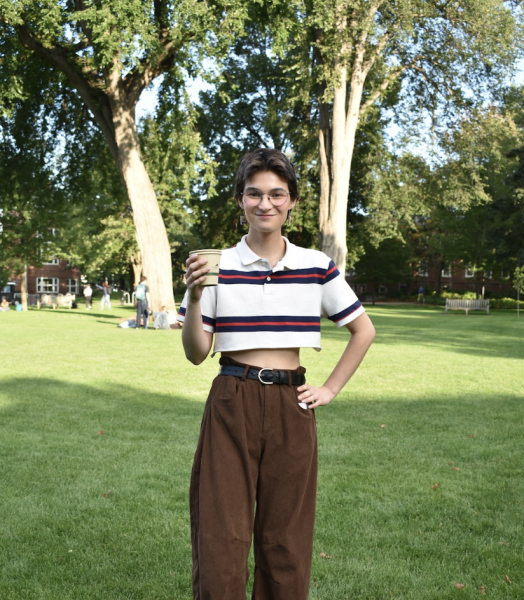On Thursday, Oct. 3, Macalester College Student Government (MCSG) convened in the Harmon Room of the library to call check on Mac Chess Club’s travel fund request. Their agenda also included voting on MCSG’s edited Bylaws, approving nominations for the Judicial Council and discussing the implementation of a “Class Leads” system.
Chess Club presented to the Legislative Body (LB) to appeal after the Financial Affairs Committee (FAC) rejected their travel fund request, which was originally submitted on Sept. 16, of $5,185.42 to send six members of Chess Club to a tournament in Toronto, Canada on Oct. 12 to 15. In meetings with FAC, the request was amended to $4,393.22, which FAC also voted to reject.
Chess Club leader Sofia Doroshenko, ’25 told the LB how important going to the tournament is to her as a woman of color, and she encourages more women and people of color to join the professional chess community.
“And because I saw so many POC and women especially [joined Chess Club this year], I want them to stay,” Doroshenko said. “There are 1,500 grandmasters that are men, and [approximately] only 40 that are women. It’s a big, big gap.”
Doroshenko also wants to put Macalester more on the map, in chess and in general.
“I want [the team] to actually try to be competitive because Macalester is kind of nowhere in terms of most [things], not just in chess,” she said. “I feel like we’re a little bit mediocre in a lot of things. And I would like us to get up. I’m sorry — I didn’t mean to offend anyone, it’s just [that] I just really want to get us out there … I really want a professional chess team.”
FAC Chair Luke Evans ’26 explained the reasons for FAC’s denial of the request, with the primary reason being the high cost per student. The request totaled $715.54 per student going on the trip, and with a yearly student activity fee of $230, this would be over three student activity fees going to an individual student’s three-day trip.
FAC was also concerned about the international travel insurance required for this kind of school trip. Whether the Study Away office could process the request within the nine days between the MCSG meeting and the proposed trip dates was unclear.
While Doroshenko is interested in making Chess Club more competitive, the org’s charter presents it as a noncompetitive club.
“We don’t, as a college, have the capacity, at times, to allow orgs that want to become more competitive to be more competitive, just because of the smaller nature of our school [and] the limited budget that we have to work with,” Evans explained.
Another more minor factor was the incomplete nature of some parts of the request. The answer provided under “Miles Traveled” was “a lot” and under “how does this align with the mission of the org,” the answer was “we are.”
Right before the LB voted on Chess Club’s appeal, Doroshenko asked for the microphone for one more contribution.
“We should be trying to get women and POC into [competitive chess],” Doroshenko said. “We should be trying to do this sort of activism in our own way. It’s kind of more than chess for me. There’s just so much sexism in there that I just get so annoyed. And I want to try to be like ‘yeah, women actually want to do this.’”
The appeal didn’t pass, with three votes in favor, one abstaining and 18 opposed.
Following, Vice President Ryan Connor ’25 led a discussion on amendments to MCSG’s bylaws. This discussion began during MCSG’s inaugural meeting on Sept. 12; MCSG typically votes on bylaw amendments by the end of their fourth meeting.
Senior class representative Elizabeth Ekstrand ’25 called attention to Associate Director of Leadership and Organization Emi Menk’s comment of “??????” on the word “SWAG” in the description of the Social Media and Outreach Coordinator’s responsibilities: “Designing and coordinating the annual MCSG SWAG.”
The LB decided to change “SWAG” to “merchandise” for clarity.
Student Organization Committee (SOC) Chair Sean Maxfield ’26 proposed changing the wording in a clause guiding how often SOC conducts formal check-ins with student orgs. The clause previously read: “Student organizations will undergo a formal check-in once every three (3) years.”
Maxfield proposed adding in the words “at least,” so SOC had the flexibility to meet with clubs in need of support more often, and changing “will” to “must.”
Class representative AnLian Krishnamurthy ’27 proposed making secret ballots for the entire LB, in order to encourage representatives to vote based on their own logic, rather than based on how other representatives vote.
Connor explained that this had been discussed before, and the LB had decided to continue with open balloting in order to promote transparency, before passing the microphone to MCSG Advisor Laurie Adamson.
“I think that [secret ballots] would fundamentally change what MCSG means as an organization,” Adamson said. “I think when MCSG talks about wanting to improve their transparency with the student body and you have secret ballots, that completely takes away your power. But I’m just the advisor.”
Class representative David Christenfeld ’27 suggested having the voting process be secret and having both the results and each representative’s vote announced after. The suggestion was met with mixed feedback from the LB, with some posing concerns about how quickly results could be posted, and others approving of possibilities for greater transparency for a wider audience.
President Joel Sadofsky ’25 reminded the LB that they were scheduled to vote on the bylaw amendments during their meeting and had been working on bylaw amendments for weeks.
“I don’t want to close off those conversations, but I also think that these are all things that we need to give proper due process and consideration [to] and have time for conversation,” Sadofsky said. “I would urge against voting on a large change like this today without having time for discussion.”
After a few more contributions about the potential drawbacks and merits of open balloting, Connor gave the context that MCSG used to publish voting records online but stopped due to representatives receiving communications from individuals outside the college critiquing them for their votes. He then asked the LB if anyone would like to propose making an edit to MCSG’s voting procedure in the bylaws and then vote on the edit next week; no placards were raised to make the edit.
The LB then voted to approve bylaws for this academic year with 22 votes of approval, no votes of opposition and one abstention.
Krishnamurthy had abstained, explaining after the meeting:
“[I felt like] people did not want to take the time to add what I was proposing [to the bylaws] and I just thought it would be wrong to vote yes when I tried to spark up some discussion.”
Sadofsky then shifted the meeting to voting in new members of the Judicial Council. The Judicial Council, he explained in communication with The Mac Weekly, is “the body that adjudicates internal affairs of the LB, mostly in cases of MCSG members who aren’t fulfilling the duties of the position to the detriment of the organization.”
Seven students applied to join the council, and all were approved in a unanimous vote of 24 in favor.
Next, Connor asked class representatives to choose their “lead” representative. This system was added to the bylaws last year but is being implemented here for the first time.
The responsibilities of the class lead would include planning and organizing class nights, answering questions specific to year and holding their class representative cohort responsible.
The class of 2028 representatives requested more time to choose a class lead. The class of 2027 selected David Christensen ’27. The class of 2026 nominated Marina Moberg ’26, who was not present at the meeting, and decided to wait until she could be present to confirm her status as class lead. The class of 2025 selected Sylvia Coyle ’25 as their class lead.
The meeting then transitioned to committee updates. The Academic Affairs Committee intends to increase communication about Mac Books in the spring.
The Student Organizations Committee met last Friday but didn’t meet with any orgs. As LB Speaker Liv Peterson ’27 explained, “they didn’t come.”
FAC recently granted Badminton Club around $1,600, after FAC negotiated the group down for capital and MacSlams was approved $2,000 to bring two poets to campus. FAC is currently working with investment club on lowering the amount of paid subscriptions needed.
The Communications and Engagement Committee is currently planning legi-SLAY-tion week.
With a final note that MCSG is invited to a focus group on Oct. 15, the meeting was adjourned.







